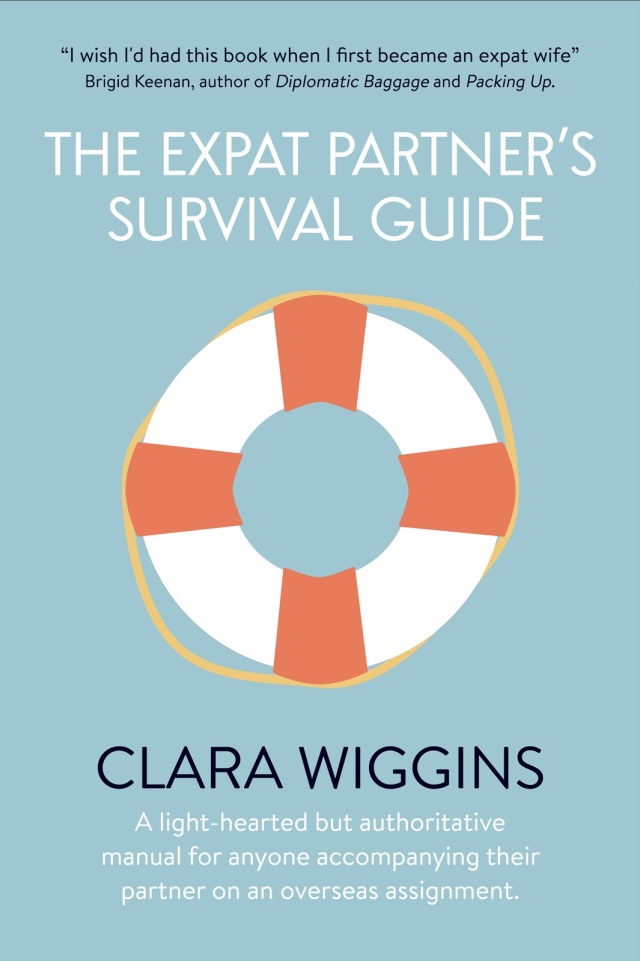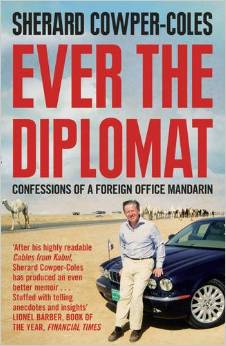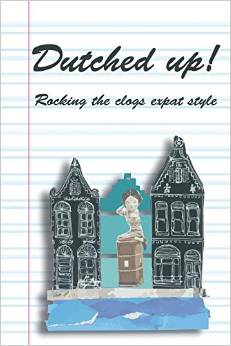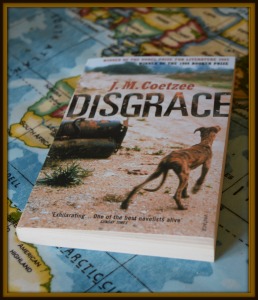Just a very quick update today. A couple of weeks ago I was delighted when my favourite expat author Brigid Keenan endorsed my book the Expat Partner’s Survival Guide – telling me she thought it was “amazing”. So delighted in fact that I wrote this blog post about it, and then followed up by putting her endorsement on my cover. It took a while to decide which of her words to use (lots of debate on various Facebook groups about whether I should or shouldn’t use the word “amazing”; how about the words “expat wife”, should it just be expat? How long a quote is too long?). In the end I decided to keep it simple, and here is the finished product:
Tag Archives: books
Review Wednesday: Ever the Diplomat
Ever the Diplomat, former British envoy Sherard Cowper-Coles’ account of his years rising through the slippery ranks of the Foreign Office, fascinated, frustrated and infuriated me in equal measures.
First of all, I should state that although I didn’t know Sherard personally, I did work in the FCO at the same time as him and our paths would have crossed occasionally (I was in the press office when he was in Private Office as Robin Cook’s Private Secretary). He was obviously a figure who loomed large in the office at the time, but I was a relatively junior diplomat so he wouldn’t have had a clue who I was. However, his book is peppered with references to people who I knew or knew of – starting with his early years when a couple of the fathers of my classmates at boarding school in the UK are namechecked; later on are mentions of people my own father worked with; and finally people I knew personally from my time in the office. From a personal viewpoint, this certainly helped make the book an entertaining read.
However, I am not sure how this translates for people who aren’t diplomats, former-diplomats or the children of diplomats. Is there just too much in-house information to make it interesting?
Hopefully not, although you may need to have a rudimentary knowledge of British foreign affairs to truely enjoy much of the book. But in many other ways I think it’s a really good portrayal of what life is like in the upper rankings of the Foreign Office. It didn’t much resemble what I experienced, but that doesn’t mean it isn’t true.
Sherard’s career was certainly a glittering one: Cairo (he was one of the famous Arabists of the office, otherwise known as the “camel corps”), Paris, Washington. Plum jobs in the UK. Later, ambassadorships in Israel and Saudi Arabia – apparently, the pinnacle of a career for an Arabist. He ended up as the UK’s special representative to Afghanistan and Pakistan, which is where it all seemed to go wrong for him. Whether because he wasn’t going to get the job at the end of his career he felt he deserved (there are only three or four really top jobs in the FCO and usually quite a few very senior diplomats vying for them) or for personal reasons (he split up from his wife during his time in Kabul, more of which below), he apparently took “extended leave” at the end of his posting and never returned….
Anyway, apart from that, Ever the Diplomat is certainly a well-written and largely entertaining book. Sherard is undoubtedly a very intelligent man and just the sort of person who would do well in the Foreign Office: he had the right background, he was the right gender, he went to the right university. The fact that he barely mentions women in the office until right at the end of the book (as if someone had read it and pointed out he really should mention that women do work in the office too) tells me a lot about him, and resonates with the sort of people I came across while working there. At one point he uses the term “the Private Office girls” to describe some of his female coworkers (see page 207).
As for his poor wife, Bridget, she gets barely more of a mention than his female colleagues. As many of us know, following (accompanying – you chose the terminology!) your partner to another country is no easy task. Upping sticks and doing it every two to four years, as the Cowper-Coles family did, can be downright distressful. Especially when you have five children. And yet, rarely does he talk about his wife positively, never does he discuss her immense role in his success. He may have wanted to leave family life out of his book as he believed he was writing about foreign policy and his career rather than anything personal. But for me, FCO life and family life go hand-in-hand. Personally, by ignoring his wife and what life was like for her and his children, I think he missed a huge trick. He might have left her out because of their subsequent divorce – or perhaps it was the other way round?
I also feel that whilst the account of his career gives us an excellent insight into the workings of the top echelons of the offce, it does rather ignore much of the rest of it: visa work, consular work, trade and investment, management…There is an awful lot more to the work of the FCO and our embassies and high commissions abroad than just the political side of things that Sherard shows us.
Other than this, Ever the Diplomat IS a good read and does contain a fair amount of interesting information and entertaining anecdotes. Sherard seems to have had an excellent window on the world throughout his career – Hong Kong department during the handover, Paris when Princess Diana was killed in the car crash, Saudi Arabia during the appalling Al Qaeda terrorist targeting of Westerners. He shows us this world from his own perspective and in an easy-going style that had me staying up late, turning pages ( in particular, for me, the chapter about Robin Cook – which coincided with my time in the press office, was fascinating). Other parts of the book I skimmed over – I couldn’t get excited about NATO or any of the defence policy sections. But overall, I would say this was a good read. As well as infuriating…
Best for: anyone who wants to understand more about the role of embassies and foreign ministries beyond visa renewal and consular assistance. People who are interested in foreign affairs and recent politics. Not for: Sherard’s wife; anyone who wants to know more about what life is like for the trailing spouse of a diplomatic high-flyer (for that I recommend Brigid Keenan’s Diplomatic Baggage).
Review Wednesday – Dutched Up
Today’s Review Wednesday looks at a book aimed at expats in, or moving to, the Netherlands. However, although it is aimed fairly specifically at that one market, I would still recommend it to other expats looking to find out more about expat life in general.
Dutched Up is a collaborative effort, a book produced by a collective of writers from around the world who are all either based in the Netherlands now or who have been in the past, and therefore all able to write about expat life in that country from a personal viewpoint. This makes for an honest, as well as often very funny, appraisal of what life is really like for foreigners living in what I have always thought would be a great expat posting.
For the most part, this book doesn’t disprove my instinct. The tales, which range from what it’s like to be short in a country of very tall people to how to steal back your bike (there are a lot of very Holland-specific stories here!), are related with a gentle sense of underlying love for their host country. There are twelve sections altogether, starting with tales of culture shock; continuing on to some of the practical elements of living aboad including eating, shopping, transportation and learning the language (which apparently involves a ‘throaty G’); then through some of those really “big” subjects like work, making friends, marriage, birth and parenting; on to matters of health; some chapters about Dutch life in general and then finally saying goodbye – and what it’s like to leave a place like the Netherlands behind (clue: sad).
By the time you reach the end of the book, you really feel like you know what life is like for the typical expat in that country, whether they be settled semi-permanently and married to a local or visiting only briefly on a short posting. It’s hard to pick out a favourite chapter as there are so many good ones, plus each will appeal to different people depending on their circumstances. But as a trained antenatal teacher, I really enjoyed the chapters about giving birth, and some of the ones on parenting were very eye-opening. However, if it’s laughs you’re after, then I would recommend the Leech – a story of a house-guest who wouldn’t leave:
By the time Saturday rolled around, we were ready to kill him. So far, he’d had his hand out, been fed, had a free place to sleep, been offered endless bottles of beer and had all the Internet and telephone access a person could possibly ever want. We hadn’t seen a thing in return. He hadn’t offered to cook dinner or offered to tidy up a bit. he had just emptied our fridge, used all our toilet paper and just made a general nuisance of himself”.
Perhaps one of the reasons I like this chapter so much is because, although it is based in the Netherlands, it could have happened to any expat, anywhere in the world. I haven’t lived in the Netherlands, and nor am I ever likely to (although I have holidayed there and thoroughly enjoyed my time), so many of the stories are interesting, funny but perhaps not all that relevant to me. However, if you are an expat in Holland, are likely ever to be one, or if you happen to know someone who is heading that way, then this would be an excellent purchase. Read it from cover to cover or dip in and out of it, I am sure you will find it a great source of both knowledge and comfort before, during and even after your Netherlands adventure.
Dutched Up is available in paperback or Kindle edition from Amazon.
Launching a book – crazy day!
Well, I am still recovering from all the excitement of launching the Survival Guide yesterday. I had so many shares and hits and views, tweets and likes, it was a little overwhelming. As all of you who have ever self-published will know, shares, likes, views, hits and general love doesn’t always equate to direct sales – but I have sold quite a few now and the numbers are continuing to rise so that’s the main thing. I just have to keep on plugging, keep on plugging…
At one point I was number 3,151 out of 6,000,000 books on Amazon.co.uk yesterday (in fact I think I even got to 2,000 and something but neglected to get a picture of it) – which goes to show just what the competition is! 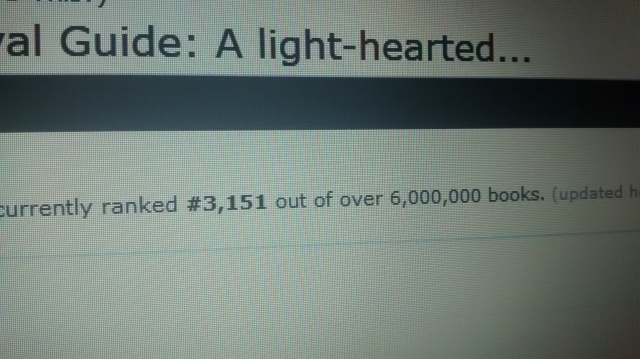 It’s a little easy to get carried away with the numbers. In this age of instant results, I am starting to get a little too addicted to updating and refreshing. How many have visited my blog? How many have liked on Facebook? How many have bought now? What’s my latest author rankings?….
It’s a little easy to get carried away with the numbers. In this age of instant results, I am starting to get a little too addicted to updating and refreshing. How many have visited my blog? How many have liked on Facebook? How many have bought now? What’s my latest author rankings?….
I am sure I will get bored of it eventually (after all, I do have other work to do, plus the marketing doesn’t really stop – I need to get back to writing more articles and posts). But in the middle of it something did happen that made me stop and think. I recieved an email from someone who just said: “From a struggling expat, thank you!”. And I realised this is what it’s all about. It’s not about shares or likes or sales or numbers. It’s about helping people. This book isn’t ever going to make me a millionaire (or even a thousand-aire) but that isn’t why I wrote it. I wrote it to help others going through what I went through, to support them and to hopefully make them feel just a little bit better.
If I can help just one expat partner/trailing spouse/accompanyng partner – call it what you will; if I can make just one person feel better then I have met my goal.
Having said that, I would still like you to buy the book 😉
Half of a Yellow Sun – a Review (part of the 2015 Africa Reading Challenge)
It’s strange when something so awful as the Biafran war happened and you don’t really know anything about it. Especially when you’ve actually lived in Nigeria, as I did when I was a child. We weren’t there long – around 5 months, in 1980 – but it was enough to understand a little bit about that huge, and hugely complicated, country. A little bit, but evidently not enough – as I really didn’t know much about Biafra.
To be fair, I was very young when we were there – 11 or 12. And what child of this age really does know about war? Except all primary aged children do learn about some wars, like World War 1 and World War 2.
So hurrah for fiction, which can open our eyes to parts of history that otherwise would totally pass us by. I have always found it easier to understand the factual side of historical events if I have first read some fiction around it. It’s easier to follow the “dry” stuff if you have some context to set it in, if you get to know some characters who were involved (even fictional characters). So, as I read my way through Half of a Yellow Sun by Chimamanda Ngozi Adichie, I constantly found myself turning to Wikipedia or other websites to find out more about what happened in that internal conflict, aided by outside forces, back in the 1960’s. I think it’s the sign of a good book when you want to know more about the era and the story that surrounds it.
And Half of a Yellow Sun certainly is a good book. It has it all, interesting characters: a fascinating backdrop, tension between family, romance, disloyalty, the turmoil of war. The book follows three main characters – Olanna, whose wealthy Igbo family enjoys a life open to few others in Nigeria; Richard, the British boyfriend of Olanna’s twin sister; and young houseboy Ugwu – through the lead-up and the duration of the Biafra war, watching as they interact with each other and others around them, all trying to find their places in the new world order.
To me the most fascinating character was Ugwu, who basically seems to slave for the wealthy, intellectual copy he lives with (there is no mention of him ever getting paid or having regular days off). He is portrayed at first as a simple sort, who learns to read from the Professor and then starts to soak up information. As events unfold, he goes where he is told, does what he is told and doesn’t seem to question his place in life. But gradually the lives of those around him, who have previously been more privileged than he, change – they are brought down to his “level” and eventually, through the awful starvation of that period, they are equals. And at the end, we realise that he is the one whose life has probably been affected the most by the events portrayed in the novel – it turns out that the book we assume all along has been written after the end of the war by the British character, Richard, is in fact a work by Ugwu. Out of the chaos of the horrendous events, there is some good – I imagine Ugwu rising above his place in life and finding a job as a professor or teacher, following in the footsteps of his “master”, professor Odenigbu.
As for the other characters, it’s hard to really warm to any of them. The twin sisters central to the storyline (Olanna and Kainene) come from a privileged background and so we learn of what the war is like for those Nigerians who have previously “had it all”. Kainene’s boyfriend is Richard, a Brit who decides he is an honorary Biafran and determinedly stays put through all the horror, even though he is helpless to stop events unfolding around him. One of the more harrowing scenes in the book involves a stop-over at an airport, where a man he was previously chatting to is massacred for being from the wrong tribe. The blind loyalty all these characters show to the “cause” is astonishing – the futility of what happened in Biafra is clear to us now, but we see events through the eyes of the characters, apparently believing they will win the war right up until the bitter end.
The book touches on other subjects, like child soldiers, rape, colonialism. But all of this is just a backdrop really to the main events – the interplay between the characters and the way all of them react to what is happening around them. It’s not an easy subject matter but it is one that is obviously very important to the author, whose own family were caught up in the war. I certainly felt like I learned a lot, but at the same time I felt entertained. I’m looking forward to reading this author again, and already have a copy of Americanah ready on stand-by.
Read my other Africa Reading Challenge reviews – Dolphin Song and Disgrace.
At Home Between the Pages by Dan Gemeinhart
A lovely post about books and how they can help children transitioning between different schools or even countries….
When I think of my childhood, two themes immediately rise to the top: movement and books.
We moved a lot when I was growing up. In the beginning it was because my dad was in the military; later, just because we were following (or looking for) jobs. From when I was born in a military hospital in Germany until I entered middle school, we moved nearly every year. I was used to putting all my stuff into boxes, then taking it all out of boxes again in a new house, in a new town, with a new school. Each move brought a different bedroom, a different neighborhood, a different teacher, different friends. My family was strong and constant, but the rest of the world swirled and shifted around us.
I was a quiet kid, shy and introverted. It’s not easy always being the new kid. Walking into a classroom full…
View original post 999 more words
Disgrace – a Review for the African Reading Challenge
I’ve come a bit late to this book. I’d heard of it, after all, it’s both a Booker and Nobel prize winner. But I hadn’t realised quite HOW well-known it is, that it’s got a film and everything. However, the fact that I didn’t know much about it meant I came to open its pages with no preconceived ideas, no reviews (good or bad) ringing in my ears and – luckily – no image of John Malkovich (the lead actor in the film of the book) in my mind. So it meant I was able to read it and decide for myself what Disgrace was about.
I loved this book. It was an interesting story and it was also one of those tales you could interpret in so many different ways. I spent a bit of time reflecting on what it all meant before I did finally read some reviews – and then realised that in fact there were almost as many different interpretations as reviews, and that in the end it is up to us – the reader – to decide what it all means.
In the book, university professor (David Lurie) resigns from his job in “disgrace” after having an affair with one of his students. It appears that the “disgrace” isn’t so much the affair as the fact that he gives her a pass mark in an exam that she doesn’t actually sit. Of course, this in itself is open to interpretation – although this is what he is pulled up for, could it be that this is the best way to get rid of the dinosaur that he appears to have become?
Lurie moves to live with his daughter Lucy in the country – and settles into an uneasy life with her. But the life is torn apart after a group of men attack Lurie, rape Lucy and shoot the dogs Lucy looks after.
This is the crux of the story, and the part which is perhaps the most open to interpretation. Why does Lucy not condemn her attackers? Does she see it as the price she needs to pay for the crimes of her people? Is this the big divide between her and her father, who represents the older generation? Does she need her father to see that he isn’t so different from the men that attacked her – although he wasn’t violent with his young student lover, he undoubtedly used his power to get what he wanted from her, and at no point does it appear she was willingly complicit in the affair. Is the “disgrace” of the title the attack, or the reaction to the attack? Or is it Lurie’s blindness about what he has done and his refusal to link events?
Lurie moves away from his daughter when their relationship deteriorates following the attack, although eventually makes his way back to the countryside where she lives. He works with one of Lucy’s friends putting down unwanted pets – mostly dogs – and the final scene sees him choose a lame dog that he had previously saved from execution. My own interpretation of this is that this is the author showing Lurie finally accepting that it’s time he changes, that the “lame dog” that he is needs to be put down. An end to the old ways?
There is so much more that could be read into Disgrace, but I am sure the reason it has been so widely praised and won the Booker and Nobel prizes is that it so neatly encompasses so many themes and conflicts (Apartheid, gender, the old versus the new) in such a relatively short and simple story. As someone who is moving to South Africa later this year, it also helped frame some of the big issues I will undoubtedly encounter. I thoroughly recommend this book.
This book is reviewed as part of the Africa Reading Challenge.
You can read my earlier review of Lauren St John’s Dolphin Song here.

